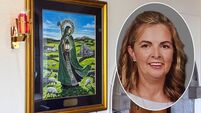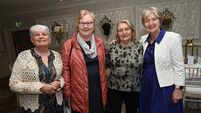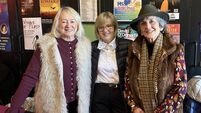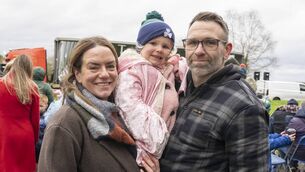Kildare business celebrates 140 years trading
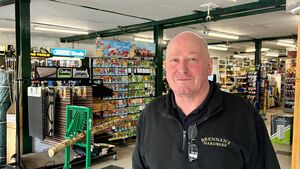
Donal Brennan
"THERE wasn't much else on the horizon, and I needed to have a few bobs in my pocket at the end of the week."
Donal Brennan was 14 when he began working in 1967 behind the counter of the family hardware and building materials business in Kilcullen.
His father Alfie had died a few years previously, and the business was being managed by the late Billy Hughes for Alfie's widow Mary.
"It wasn't an easy time," said Donal. "When my father died, my mother didn't know much about the business. And there wasn't much money to do anything because there were big death duties to be paid."
But this year D Brennan & Sons is quietly celebrating 140 years of a local business dynasty.
The enterprise was established back in the 1880s when Denis Brennan, whose original auctioneering place of business had been across the road, married Theresa Doyle, owner of a drapery shop.
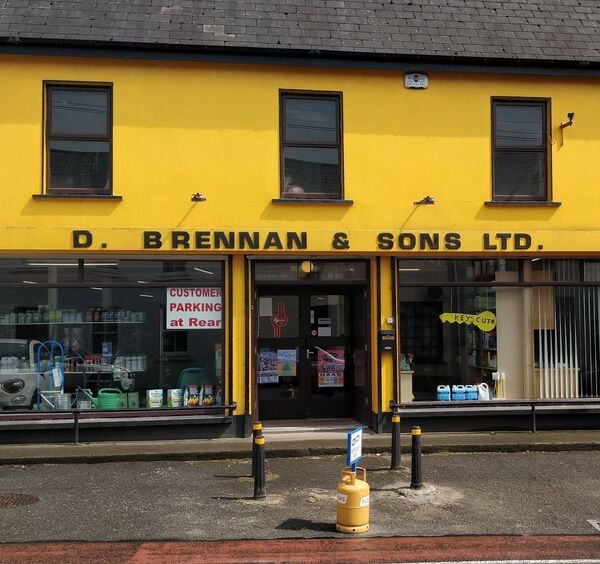
Dublin House, as it is still known to the postal system, became the Brennan family home, and the operation expanded to include grocery, hardware, seeds and feedstuffs and manure, funeral directors and motor engineers.
Caltex petrol was sold there from the 1930s, and in the 1940s Brennan's were also main agents for Massey Ferguson tractors. The petrol pumps at Brennan's were removed in the late 1970s and what had been a garage became the retail hardware shop.
Donal took over management in the mid-70s, and between then and the 1980s the 'footprint' of the operation more than doubled, taking in what had been known as Denis Brennan’s 'auction field' at the back.
Some years ago, Donal handed over responsibility to his own son Danny, who now runs it with his wife Lucia.
Working with Donal back in 1967 was Herbie Sheehan, who retired in 2017 after half a decade with Brennan’s — "he started the same day I did" — along with Pat Goulding who retired from his own hardware business in Naas in 2022. Billy Hughes had been employed there since 1953, taking up a place vacated by the late Sean Keegan who had left to start up what became his own very successful hardware operation in Newbridge.
"Billy was originally from Kinnegad and worked in a bar in Kildare before coming to us," Donal recalls.
He stayed with Brennans until he retired in 1987. "He was always very cagey about his age, because he didn't want to retire, ever."
Donal recalls his own early years at the counter as being hectic. With the end of protectionism, and the recession the policy had led to in 1950s Ireland, an upshift in the country's fortunes brought improved living standards and increased expectations.
In 1973 Ireland also joined the European Economic Community (EEC). A building boom was one result.
"We were going full tilt getting stuff out. Everything was manual then, including the paperwork — not like today with computers, you can press a button and data flows out."
The oil price shock of the mid-1970s triggered a spectacular global inflation. In Ireland it was compensated with annual average wage increases of over 18 per cent, so the apparent good times continued, albeit at a growing cost.
"Everybody had money, but it was borrowed money. We used to work all day in the shop and often at night we'd spend two- or three-hours changing prices because the costs of our stock kept going up. If we didn't, we'd quickly be selling for less than what we were paying."
In the 1980s another oil price shock tipped Ireland and its accumulation of public borrowings over the edge of an economic cliff.
"In our business then we were trying to bring in money due to us, because many customers had been buying on tick, and we had paid our suppliers."
Donal recalls that 'everybody was in the same boat', but there was little, if any, solace in that. "It was a seriously difficult time."
Ireland also experienced two major bank strikes, in 1970 and 1976, during Donal's early days. Many cash-based businesses effectively became banks for each other and sometimes for their customers, giving cash out for cheques.
"You had to be careful about who you dealt with. On the other hand, people were conscious of what you were doing for them, and as far as I remember we only ended up with two bad cheques."
He also has strong recollections of driving to Dublin with a large bag of cash to pay for shipments of cement.
Donal can look back over more than a half-century of business and social changes in Kilcullen. The developments that became possible in 2000, when the community was finally connected to the county sewerage system, were a game-changer.
"Before that, Kilcullen was heading to be another Dunlavin. Almost the only thing you could get in the village was the bus to leave it."
New housing, and their owners’ needs for more light hardware, has provided another pathway for a business that has changed much in 140 years, and is ready to adapt again.
"Fuels, for instance, have become very big. We used to sell a lot of coal, then the smokey fuel ban arrived, and we started doing a few logs. That took off, and now we kiln-dry our own timber to meet the demand."
Donal still goes into the shop most days, even though officially retired.
"What else would I do?" he says with a wry smile. "It keeps me going, and if I stayed at home, I'd have to reorganise myself."
With the business having weathered three major recessions in his own lifetime, does he advise the current generation of Brennans? He has another smile.
"I'll give an opinion, if I'm asked. Whether they listen, that might be another matter."
If they ask, they have to listen.
